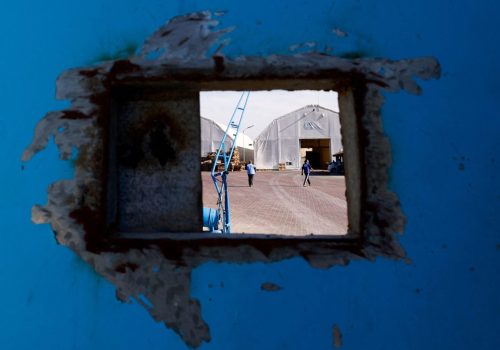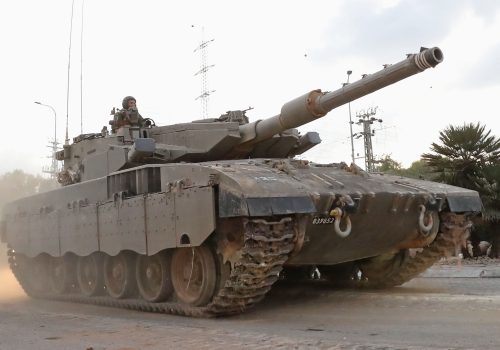
Israel’s ground war in Gaza has started. How will it end?

JUST IN
“This is our second war of independence.” On Saturday, Israeli Prime Minister Benjamin Netanyahu announced that a “second stage” in Israel’s war against Hamas has begun. Ground operations in Gaza by the Israel Defense Forces have two goals, Netanyahu said: the destruction of Hamas’s military and governing capabilities, and the return of hostages taken during the terrorist group’s October 7 attacks. Underscoring that the conflict would be “long,” he compared it to the 1948 war that led to Israel’s founding—a war that, among Palestinians, is known instead as the Nakba, or the “catastrophe.” Meanwhile, nearly three weeks of heavy Israeli airstrikes have created a dire humanitarian situation in Gaza. Below, Atlantic Council experts share their insights on what to expect next.
TODAY’S EXPERT REACTION COURTESY OF
- Jonathan Panikoff (@jpanikoff): Director of the Scowcroft Middle East Security Initiative and former deputy US national intelligence officer for the Near East (he’s expressing his own views, which do not imply US government endorsement)
- Tuqa Nusairat (@TuqaNusairat): Director for strategy, operations, and finance at the Rafik Hariri Center & Middle East Programs
- Alex Plitsas (@alexplitsas): Nonresident senior fellow with the Middle East Programs’ N7 Initiative and former chief of sensitive activities for special operations and combating terrorism in the Office of the Secretary of Defense
An existential fight
- Saturday’s comments from Netanyahu, Defense Minister Yoav Gallant, and war cabinet member Benny Gantz indicate that this conflict is “fundamentally different” than previous rounds of fighting between Israel and Hamas, Jonathan tells us. Their rhetoric, including the use of “never again” in reference to October 7, the deadliest day for Jews since the Holocaust, indicates that they believe Hamas “represents an unbearable threat to the people of Israel,” Jonathan adds.
- Tuqa predicts “dark days ahead” for the region “as Israel and its Western allies continue to seek military solutions for a decades-old conflict that can only be solved by addressing the legitimate grievances of the Palestinians and their cry for an end to the occupation and an independent Palestinian state.”
- Israel’s leaders were cagey about the specifics of the current ground operations, as communications have been cut to Gaza. Alex expects “a cordon and search operation in which they will go building-to-building to search for and destroy Hamas military capability, including command and control, weapons caches, key leaders, and Hamas fighters who decide to stay and fight.”
Subscribe to Fast Thinking email alerts
Sign up to receive rapid insight in your inbox from Atlantic Council experts on global events as they unfold.

-
-
This field is for validation purposes and should be left unchanged.
On the ground in Gaza
- This conflict has already seen thousands killed, hundreds of thousands displaced, and nearly half of Gaza’s homes damaged or destroyed. It “will lead to the largest humanitarian catastrophe the conflict has ever seen, reminiscent of the Nakba that displaced hundreds of thousands of Palestinians in 1948,” Tuqa says.
- And that catastrophe, Tuqa argues, will not make Israel safe in the long run. What’s left “will be a newly traumatized generation of [Palestinian] youth—none of whom were born or of voting age when Hamas was elected [in 2006]—still determined to realize the dream of their parents.”
- The campaign will take “weeks or probably months,” Jonathan predicts, but when it’s over “the more strategic question will still have to be answered: Who is responsible for Gaza now?”
Threat of escalation
- US officials have likely been pushing behind the scenes for Israel to conduct only “smaller, targeted ground operations” to limit civilian deaths, Jonathan says. “The United States is probably assessing that this course of action, combined with its own deterrence efforts in the region, is the best chance to limit the conflict from spreading beyond Israel and Gaza, a goal shared by European and Middle Eastern countries, too, not to mention China.”
- But the trend lines point in a worrying direction. The United States struck Iran-backed militia sites in Syria on Friday, in response to attacks on US military bases in the region. Meanwhile, “tit-for-tat attacks between Israel and Hezbollah,” Jonathan tells us, “have the potential to result in an unintended escalatory spiral that leads to a full-scale war in northern Israel.”
- Alex notes that if Hamas is functionally destroyed, Iran could “activate” its proxy Hezbollah in Lebanon. But that would risk Hezbollah being “severely degraded” in a fight with Israel and perhaps the United States. “In doing so, Iran would expend its largest proxy, limiting its ability to respond indirectly and avoid a direct confrontation for contingencies such as a strike on its nuclear program—an issue that remains unresolved.”
- In all, Alex says, “the situation remains an unstable powder keg.”
Further reading
Fri, Oct 27, 2023
Experts react: What to know about Israel’s expanding military operations in Gaza
New Atlanticist By Atlantic Council experts
In what could signal the initial steps of a larger invasion, Israel has announced that it is “expanding” ground operations in Gaza, with the goal of eradicating Hamas.
Tue, Oct 24, 2023
The global consequences of the Israel-Hamas war are just beginning. Here’s what to watch.
The Big Story By Kirsten Fontenrose
It’s hard to predict what decisions the players will make tomorrow, but here are the early warning signs that could indicate what will come next in the Middle East and beyond.
Wed, Oct 11, 2023
What to expect from Israel’s ground invasion of Gaza
New Atlanticist By Alex Plitsas
Israel appears set to initiate a months-long ground campaign that is designed to completely eliminate the terrorist threat posed by Hamas and to prevent and deter a attack like October 7 from ever happening again
Image: Israeli Prime Minister Benjamin Netanyahu holds a press conference with Defense Minister Yoav Gallant and Cabinet Minister Benny Gantz (not pictured) in the Kirya military base in Tel Aviv , Israel , 28 October 2023. ABIR SULTAN POOL/Pool via REUTERS



